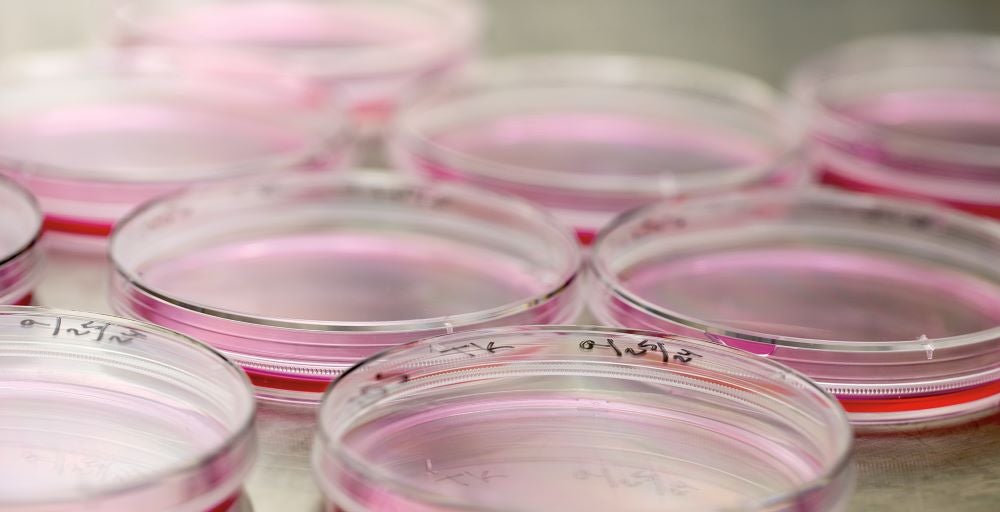
Dean, College of Pharmacy
When Kerry LaPlante looks out her office window, she can see exactly where URI’s proposed new life science building will be. As dean of the College of Pharmacy, she knows as much as anyone how sorely it’s needed.
“We have the talent, we have the expertise, we have the people, we just need the space,” LaPlante says.
Since moving into its current building more than a decade ago URI’s College of Pharmacy has grown to the top 10 percent of colleges of pharmacy in research funding, with more than $21 million in annual grants. The college is unique in that nearly all its research is focused on finding practical treatments for diseases and other ailments.
Research at the college falls in one of three areas. The first is neuroscience and healthy aging, which focuses on the prevention and treatment of neurodegenerative diseases such as Alzheimer’s and ALS, and age-related illnesses, mental health, and substance abuse issues. Rhode Island is in the top third of all states in the percentage of residents 65 and older, making healthy aging of particular importance in the state, LaPlante notes.
The second area of research is immunology, infectious diseases, drug delivery, vaccine development, and natural products, focusing on treatment of diseases, including cancer, multiple sclerosis, diabetes, and infectious diseases, as well as nutrition and food as medicine.
“We look at the whole patient, and whole health,” LaPlante says, noting that Rhode Island’s reputation as a “foodie” state with fresh seafood makes it a particularly ripe place to study healthy eating.
Lastly, the college focuses on issues of health care accessibility, by involving pharmacists in state public health efforts, advocating for fairness in medicine and access to vulnerable populations. There is a broad array of scientists across the research areas investigating a wide range of diseases and potential treatments.
The George & Anne Ryan Institute for Neuroscience (GARIN), which has been based at the college since 2013, conducts cutting edge neuroscientific research on campus. The College also houses the Rhode Island IDeA Network of Biomedical Research Excellence (RI-INBRE), a statewide effort sponsored by the National Institutes of Health (NIH) to build the state’s capacity for biomedical research since 2001.
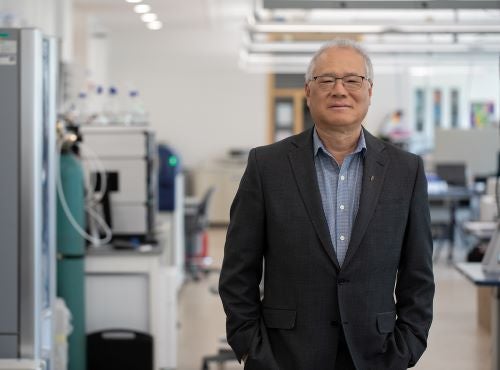
Program Director, RI-INBRE
Professor, Biomedical and Pharmaceutical Sciences
Bongsup Cho, RI-INBRE program director and a professor in the College of Pharmacy who studies the molecular basis of DNA damage and cancer, explains, “It’s one of the longest-running NIH supported programs, bringing in more than $100 million from 2001 to 2029. This funding significantly impacts biomedical capacity building in Rhode Island.”
As program director, Cho oversees the distribution of funds to a network of nine institutions across the state, including URI, Bryant University, Brown University, Johnson & Wales University, Rhode Island College, Community College of Rhode Island, Providence College, Roger Williams University, and Salve Regina University. Headquartered on URI’s Kingston Campus, the program provides faculty development support through research grants, the use of core facilities, and student training opportunities.
“We’ve supported 218 faculty and 802 projects. More importantly, we’ve trained over 2,210 students, mostly undergraduates who represent the next generation of the biomedical workforce.”Bongsup Cho
Among the researchers the program has supported is Jaime Ross, assistant professor of biomedical and pharmaceutical sciences and Ryan research assistant professor of neuroscience, who investigates the molecular mechanisms inside the brain that lead to Alzheimer’s, Parkinson’s and other neurodegenerative diseases.
Although Ross is trained as a neuroscientist, being at the College of Pharmacy inspired her to research toxic substances and how they affect brain health.
“We’re trying to understand the influence of exercise, diet, healthy sleep habits and other modifiable factors that help us stay healthy as we age and so we look for biomarkers of aging we can monitor.”Jaime Ross
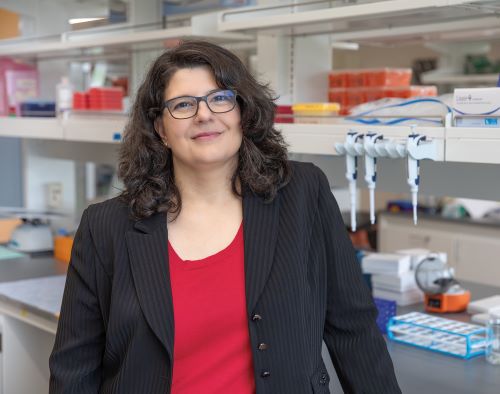
Assistant Professor, Biomedical and Pharmaceutical Sciences
Ryan Research Assistant Professor of Neuroscience
Her lab recently examined the effects that microplastics, found in seawater and drinking water, can have on the brain. Working with mice, she found that with just three weeks of exposure, microplastics diffused throughout the body, crossing the blood-brain barrier, and causing confusion and erratic behavior.
“The plastics just went everywhere,” she says. “We found that they dramatically affected the cognitive functioning and neuro-behavior of both young and old mice, but especially in older mice.”
The RI-INBRE program has also supported the purchase of advanced lab equipment for spectrometry, DNA sequencing, fluorescent microscopy, biosensors, and other specialized tasks.
Cho adds, “This is equipment individual faculty cannot afford to have in their lab. Our job is to maintain the equipment so they work efficiently.”
RI-INBRE has secured funding from the Rhode Island Department of Labor and Training to implement a summer workforce development and training program to train students throughout the state on this advanced equipment free of charge. The new biomedical sciences building will allow the University and RI-INBRE to expand their programs.
“We’re making a difference in the portfolio of skills that students have to allow them to apply for jobs,” says Cho.
Pharmacy doctoral candidate Lauren Gaspar has been researching the effects of microplastics exposure on human health in Professor Ross’s lab since 2020. She studies how exposure to microplastics may interact with other factors such as age and genetic predisposition to disease to exacerbate adverse health outcomes.
Gaspar says, “In our first study, we found that short-term exposure to microplastics via drinking water induced behavioral and inflammatory alterations in our subjects. The microplastics were translocated to nearly every major organ, including the brain.”
“In our first study, we found that short-term exposure to microplastics via drinking water induced behavioral and inflammatory alterations in our subjects. The microplastics were translocated to nearly every major organ, including the brain.”Lauren Gaspar
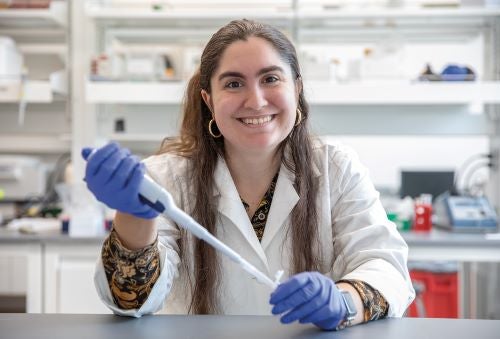
Doctoral Candidate, Biomedical and Pharmaceutical Sciences
Gaspar has focused on how plastics exposure in the brain may impact diseases such as Alzheimer’s.
“I believe the work we have done, and are continuing to do, has far reaching implications in numerous fields including neuroscience, toxicology, and environmental sciences,” Gaspar says. “The technical experience I have personally gained will be invaluable to me as I move forward with my career.”
Marin Manuel, assistant professor of biomedical and pharmaceutical sciences and Ryan research assistant professor of neuroscience, who joined University three years ago from the Centre National pour la Recherche Scientifique in Paris, France, offers an example of yet another researcher who has been making breakthroughs.
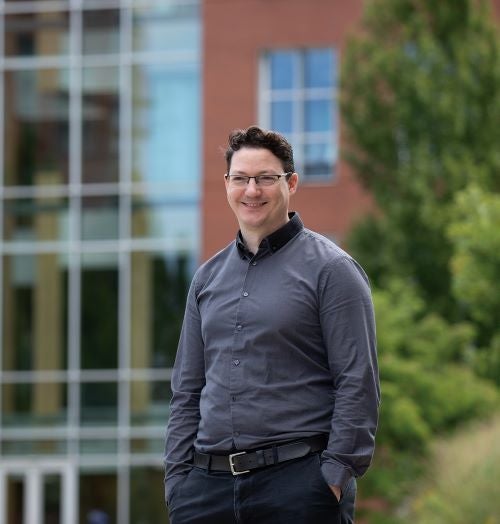
Assistant Professor, Biomedical and Pharmaceutical Sciences
Ryan Research Assistant Professor of Neuroscience
Manuel’s lab examines how the spinal cord works, including motor neurons’ electrical properties that might contribute to the degenerative disease ALS. By inserting tiny electrodes in the spinal cords of mice, his lab has found evidence that these motor neurons start to misbehave long before they die.
“That means that somehow the system is able to compensate for this, but has to work extra hard,” Manuel says. “It starts slowly and keeps accumulating problems over time until the system cannot work.”
If these changes can be pinpointed eventually, they could possibly serve as markers for the disease or help delay the appearance of symptoms in those afflicted.
Dean LaPlante’s research focuses in part on multiple drug-resistant bacteria, including Methicillin-resistant Staphylococcus aureus (MRSA). She receives calls from doctors worldwide treating infections resistant to antibiotics and helps optimize therapeutic dosages.
“They’ll say this bacterium is resistant to everything, and the patient will not last until Friday,” she says. “My research finds synergistic combinations of different antibiotics with different mechanisms that work together.”
In addition, her lab analyzes data from more than 150 Veterans Administration hospitals—the largest health system in the country—to find patterns and reduce the time it takes to research and implement treatments.
LaPlante says the new biomedical facility will expand research at the College of Pharmacy, while significantly benefit the University and the people of Rhode Island.
“We’re bringing in tenure track faculty from all over the country, and they are excited about our community and our research,” she says.
Unlike other science departments at URI, the College of Pharmacy is unique in that nearly all its research is focused on finding practical treatments for diseases and other ailments.
